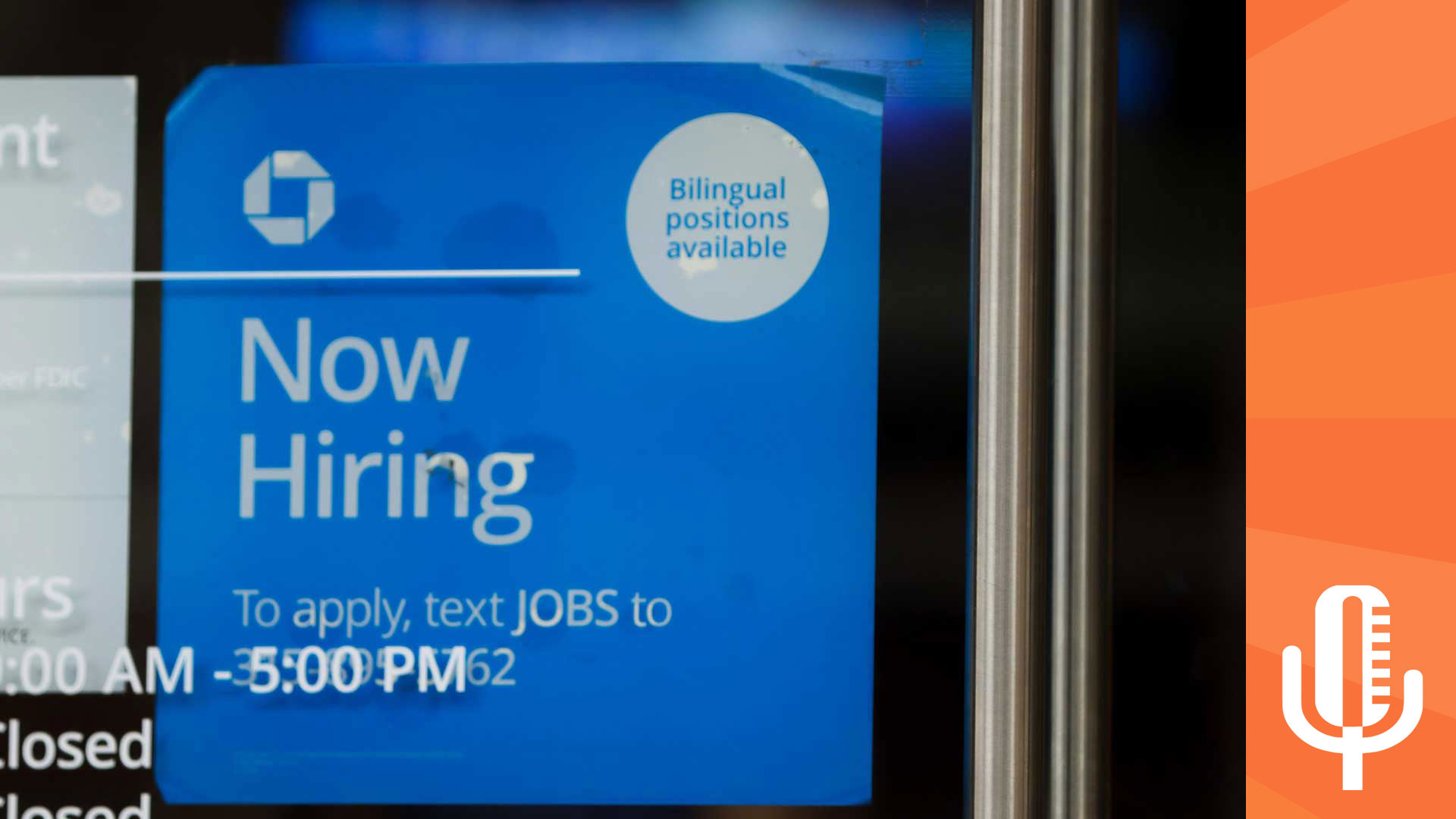 Help Wanted A now-hiring sign is posted at Chase Bank in downtown Phoenix. February 2023
Help Wanted A now-hiring sign is posted at Chase Bank in downtown Phoenix. February 2023
The Buzz for August 23, 2024

It's Hot Employment Summer in Arizona.
State and federal reports show unemployment has been under 3.5% for the past three months, a feat the state has never before experienced.
That record-low rate comes as the state continues to add workers and jobs, both of which are also at record levels.
"The labor market is tight, but that's a double-edged sword," said Dr. George Hammond, Director of the Economic Business and Research Center at the University of Arizona. "So for workers, that's usually a good thing. There means lots of job opportunities, it means rising wages, but the other side of the coin is the employer perspective. And from the perspective of employers, it's not always such a great thing, because it means that we have to work a lot harder to attract and retain the workers that we need."
Hammond said that unemployment in Arizona is statistically significantly lower than the nationwide average. It is also bucking a national trend that is seeing rates go up, even with the slowdown caused by interest rate hikes.
"The construction sector has been rebounding, even though housing affordability is down significantly. Overall, we've dealt pretty well with the increase in interest rates that we've seen over the past couple of years. We have seen impacts. Manufacturing jobs are actually down over the year, not so much in the computer and electronic product sector, which you know, will eventually reflect those semiconductor jobs that are coming online."
He said unlike in 2007, Arizona's economy is likely strong enough that it would weather a nationwide moderate downturn. But he has a bigger concern.
"Housing affordability was reduced significantly because house prices rose so fast and because interest rates increased. We've seen significant increases in housing permit activity. It weakened a little bit last year, but it looks like it's going to be strong in 2024. So builders are busy, and they are building houses. The issue from the housing affordability perspective is that those houses are coming online at higher prices than they were before the pandemic, partly because materials prices are up and labor costs are up due to tight labor markets. I don't think we're going to see relief very soon for housing affordability, I think it will take time for incomes to catch back up to where house prices and rents are now."
That tight labor market has not been a boon for everyone though. AZPM Student Journalist Samantha Callicutt traveled to a Tucson-area job fair where she spoke with Rebekah Streeter, who left her job as a teacher and has been searching throughout the summer.
"I just knew I needed to make a change. I'm open," she said. "I like working with people. I'm also creative. I studied art in college, so it'd be nice to use those skills, but I'm really open to lots of things. I just need an income. I've applied to so many jobs. It's been like four months. I probably apply to five jobs a week or something. Usually, it's online, that's what most of it is. And I rarely hear back."
Employers at that job fair were also trying hard to find what they wanted. That includes Cyracom International, a language interpretation company that was looking for people who are fluent in English and a second language, particularly Spanish, Korean, or Mandarin.
"We try to support as much as we can," said Cyracom's Natalie Para. "We try to come to events like this and let people know what we're hiring for. Also, we don't want people to feel discouraged like thinking, Oh, I may have to have the experience for it, but we're here to kind of show you more confidence and say, if you know the language, we will train you for it."
Christina Ramirez of the Vail Unified School District said that, despite low unemployment, it still receives several applications for many of its open jobs, particularly those of an administrative nature. She offered advice to applicants.
"Reach out to the individual sites and the schools. A lot of times, because they're so inundated with applications, the best thing to do is to get on that phone and call, introduce yourself, and just say, 'Hey, I'm interested in this position. I just applied for it.' A lot of times. It's the first time that they're pulling that application, so you have a higher chance of getting seen and getting heard."
Hiring people with the right skills can be a challenge in Arizona right now, according to Danny Seiden, President and CEO of the Arizona Chamber of Commerce and Industry.
"If I start a meeting off at the chamber, and we represent the largest conglomerate statewide of employers, they all say workforce. They've been saying it for a long time. They're having a hard time finding the talent that they need. And our universities and community colleges have stepped up."
He mentions efforts to increase engineers, hospitality and tourism workers, and other fields that need a certain skill set.
"There was, I think, for a long period of time, we had a lot of folks who did the trades, who put the time in to learn a skill like welding or any trade. There was, for a long time, a big push on that. And then we had generations who were again, more focused on higher education, going the traditional four-year route. And I think we realized we're really lacking for some skilled workers. So I think you look at the community colleges, you look at our certificate as well as [Joint Technical Education]. People are learning crafts and trades as early as high school and finding very profitable, very entrepreneurial, successful careers."
Seiden said that one area where help is sorely needed is housing. He mentioned that most growing economies run into hurdles, but Arizona currently has a handful of them.
"We haven't built the supply that we need, so we have an overflow of demand, and that does push prices up. And this is the argument that I wish people would realize we just need to build more. It's not that the builders don't want to build more. They're encountering different regulatory issues at the city level, at the state level, and we were the only state in the only state in the country that requires 100-year water assurance, so we have all these hurdles to get through, and it's really slowed the building that we need."




By submitting your comments, you hereby give AZPM the right to post your comments and potentially use them in any other form of media operated by this institution.